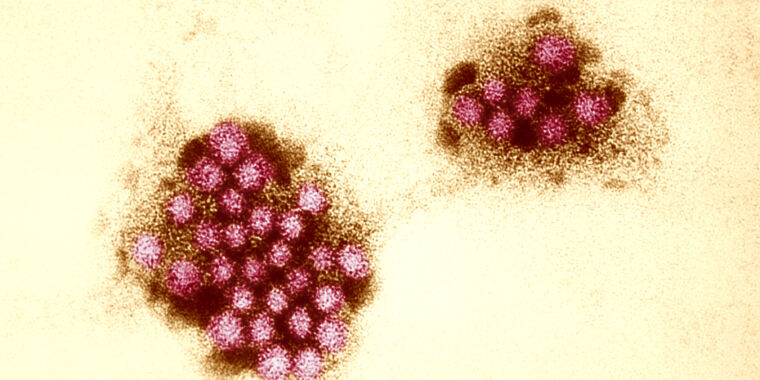It’s official: the winter of 2023 has been a season of sickness. The Centers for Disease Control and Prevention’s Norovirus Sentinel Testing and Tracking (NoroSTAT) network reports that the number of norovirus outbreaks at the end of February 2022 hit a season peak exceeding that of any previous season since surveillance began in 2012.
What’s more, the percentage of positive norovirus tests at the end of January has surpassed the peak percentage seen last year in March. Though the data suggests the virus may have peaked on a national level, regional data shows cases are still floating upward in the Northeast, Midwest, and Western US, with numbers in the South seemingly sinking.
Norovirus is a highly contagious virus that causes acute gastroenteritis, often leaving victims gutted from violent and frequent vomiting and diarrhea. It can be transmitted directly from infected people and also via surfaces, food, and liquids that have been contaminated. The main prevention method for norovirus transmission is thorough hand washing. And it’s important to note that hand sanitizers generally don’t work at disarming norovirus.
The CDC estimates that norovirus causes an average of 19 million and 21 million diarrheal and vomiting illnesses each year in the US, sending nearly 1 million children to the doctor’s office, hospitalizing over 100,000, and killing 900, mostly people aged 65 and older. Most infections occur between November and April, though the virus can strike anytime during the year.
Survey data released by the Kaiser Family Foundation found that 38 percent of US adults said that their households were hit by either flu, RSV, or COVID-19. This winter has been far less deadly than the start of 2022, but the US is still grappling with the spread of these illnesses.
It’s important to take the necessary precautions to protect yourself and your family from norovirus. The CDC recommends thorough and frequent hand washing, and avoiding contact with people who are sick. With the right precautions, you can help keep the spread of norovirus to a minimum.
Source: arstechnica.com
